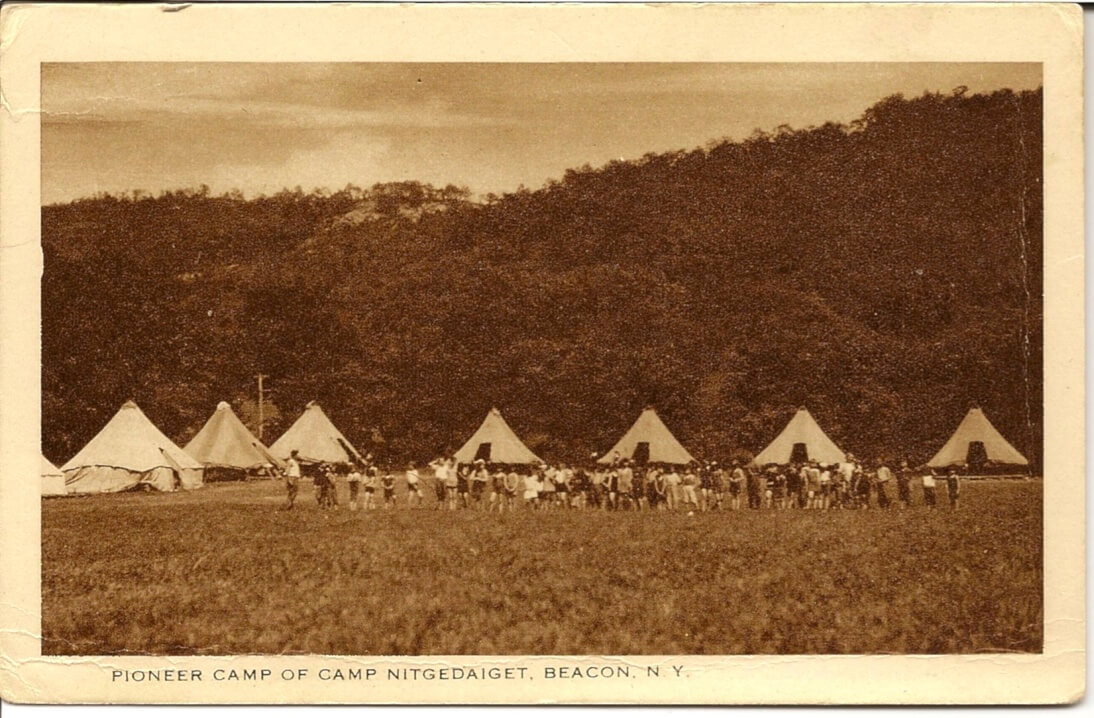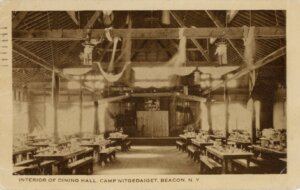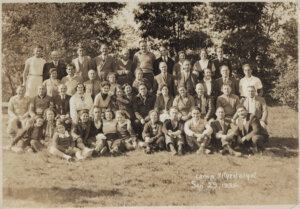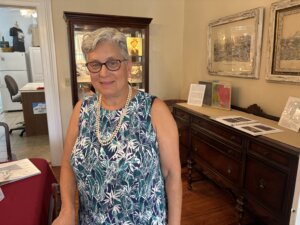Greetings Comrade, and welcome to the Communist camp for working-class Jews
Located near Beacon, New York, Camp Nitgedaiget offered a proletarian alternative to the Borscht Belt

Pioneer camp tents at Camp Nitgedaiget. Courtesy of Beacon Historical Society
When Jewish families started summering in the Catskills’ Borscht Belt hotels in the 1920s, there was a very different scene taking place on the other side of the Hudson River. A couple miles south of the town of Beacon, working-class Jews with leftist political sympathies were gathering in a proletarian vacation resort with ties to the Communist Party. Most of the workers who came to Camp Nitgedaiget to escape the steamy New York City summers were employed in the needle trades.
“These are people who never had a vacation or had no money to leave the city,” said Diane Lapis, a retired kindergarten teacher who spent 10 years researching the scene at Nitgedaiget (“Nish-guh-die-get“). The fruits of her labor are on display in a new exhibit at the Beacon Historical Society.
Camp Nitgedaiget is considered the first cooperative proletarian year-round vacation resort in the United States. The resort’s name came from “nishtgedeiget,” the Yiddish phrase for “no worries.” At its peak, 1,000 people enjoyed the rural retreat’s fresh air every day. The doors of Nitgedaiget’s four-story hotel and its bungalows were adorned with the hammer and sickle, an emblem of Soviet communism and working-class unity. Guests called each other “comrade,” and when they went for meals in the Nitgedaiget dining hall, which could accommodate 800, Comrade Vladimir Lenin’s portrait surveyed the scene.
The 250-acre property included platform tents in the woods, a lake, pool and waterfall. Visitors could go fishing and boating in the Hudson River.
What, them worry?
Camp Nitgedaiget was opened in 1922 by the United Workers’ Cooperative Association. The association comprised working-class Jews. It also built the United Workers Cooperative Colony, a 700-plus apartment complex on Allerton Avenue in the Bronx that came to be known as the Coops.

“The fact that regular, everyday working people created these institutions that have such rich culture and extensive operations is really a remarkable feat,” said Stephen Payne, director of the Bronx County Historical Society, whose holdings include voluminous documentation on Nitgedaiget and the Coops.
There don’t appear to be any living local residents who remember the place. At the exhibit’s opening on July 26, David Wood, a longtime resident of Beacon, recalled that Pete Seeger bought a 17-acre parcel of land next to Nitgedaiget after performing at the camp in 1949 and became a lifelong resident of Beacon.
Woody Guthrie sang at the resort in 1940 and 1941. Among other boldface names associated with Nitgedaiget, the actor John Garfield worked there in the 1930s, and Paul Robeson stayed in Hotel Nitgedaiget in August 1949, the night before his aborted concert in Peekskill. The concert stage was set on fire and 13 people were seriously injured by a rioting mob of anti-communists.
Allen Ginsberg and his mother spent time at Nitgedaiget in the 1930s. In his seminal poem “Kaddish for Naomi Ginsberg,” he referred to Nitgedaiget as Camp No-Worry.
Where did all the leftists go?
Lapis first learned about Nitgedaiget from a friend who was working on a documentary film about teenagers. Her friend found a collection of photographs at the Library of Congress labeled “communist camps” and copied scores of images for her.
“The images were so compelling, I needed to find out more,” Lapis told me. “It was like, ‘What was going on there?’”

What was going on was that, in addition to sports and outdoor recreation, Nitgedaiget’s social and cultural scene included political speakers, performances by stars of the Metropolitan Opera, jazz concerts, dances and a casino.
Lapis found that local residents didn’t get to enjoy these activities, nor did they have a hand in the resort’s operation. The camp closed by 1950, she said. The hotel, dining hall and casino burned down in 1963 in what the local fire chief believed were acts of arson. The property is now nestled within a 6,000-acre nature preserve in Hudson Highlands State Park.
Nitgedaiget and other left-leaning camps and bungalow colonies faced harassment and fears of violence from the Ku Klux Klan and other right-wing forces. Camp Wo-Chi-Ca in Hackettstown, New Jersey, which was affiliated with the Communist Party, changed its name to Camp Wyandot in 1950 and moved to Mount Tremper in the Catskills. In 1966 Camp Webatuck in Wingdale, New York, was the site of a failed bombing attempt by the local lodge of the national Minutemen. Webatuck, which was run by Janis Ian’s parents, changed its name to Abelard and moved to Hunter, New York, the following summer. Followers of the Trail, a left-wing bungalow colony in Buchanan, New York, changed its name to Reynolds Hill Colony after the 1949 riot at the Paul Robeson concert in Peekskill, in part as an effort to distance it from further attacks.

Another factor in Nitgedaiget’s demise was demographic. Many in the first generation of guests were immigrants. But after World War II, many came back and attended college under the GI Bill, then got jobs that lifted them out of the working class. Some of the Nitgedaiget regulars from the Coops had moved to the suburbs, where they had cars and no longer needed to get on a bus from the Bronx to come up to the country.
But the phenomenon of left-leaning summer camps, proletarian resorts, and bungalow colonies actually didn’t peak until the 1960s, according to Billy Yalowitz, an emeritus profess of arts at Temple University who is researching left-wing secular Jewish communities in the Hudson River Valley for a book. Yalowitz estimates there were as many as 40 or 50 institutions that could be described as communist, socialist, labor Zionist or anarchist.
“Back in the day, the socialists weren’t talking to the communists who weren’t talking to the anarchists,” Yalowitz told me. “But their culture was so similar. You had a tiny little bungalow, a lot of communalist culture, lots of singing, lots of sports, lots of … dramatic productions, lots of joy, lots of love, and lots of arguing.”
Yalowitz is the son of a community organizer and a social worker. His father went to Camp Wo-Chi-Ca as a boy. His parents owned a bungalow in a cooperative community in Goldens Bridge, New York, which is still going strong 98 years after its founding. The 150-acre property is about 23 miles southeast of Beacon. Yalowitz still spends time there at the “ancestral home.”
“Because of McCarthyism and the passing of the Yiddish-speaking refugee founders of these communities, these stories struggled to be conveyed,” Yalowitz told me. “The history is really in danger of falling into obscurity.”
“I think younger Jews today, progressive Jews in their 20s, 30s and 40s, would be very inspired by this and quite proud that it’s part of their heritage,” he said. “But if you didn’t grow up in this lineage, you wouldn’t have learned about it.”















